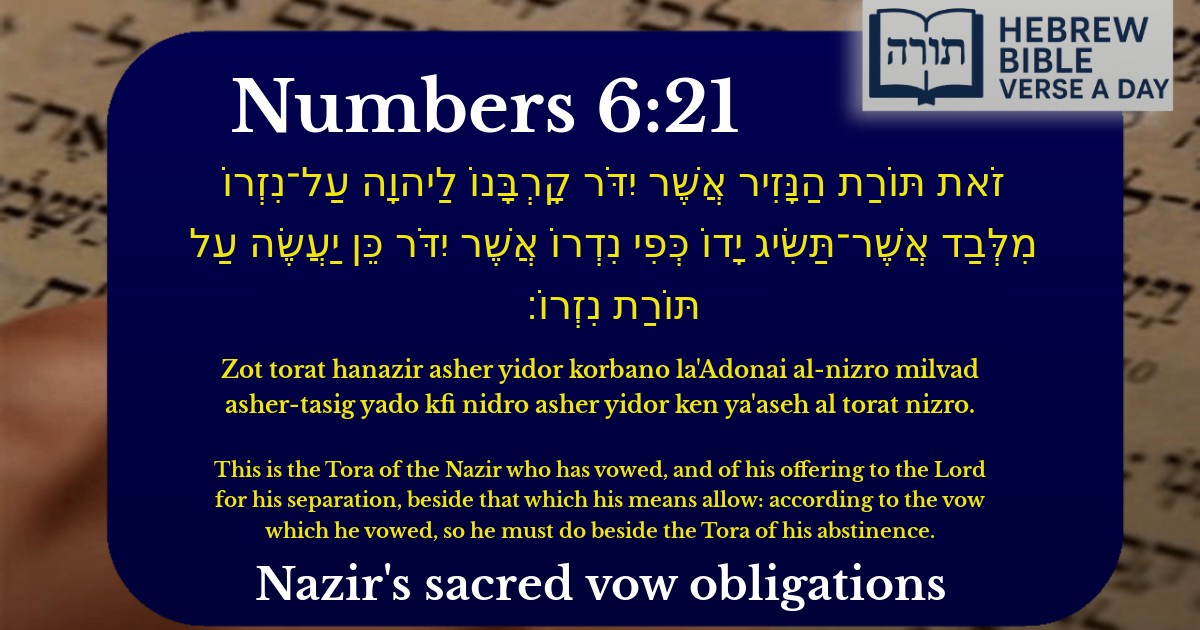Join Our Newsletter To Be Informed When New Videos Are Posted
Join the thousands of fellow Studends who rely on our videos to learn how to read the bible in Hebrew for free!
Hebrew Text
זֹאת תּוֹרַת הַנָּזִיר אֲשֶׁר יִדֹּר קָרְבָּנוֹ לַיהוָה עַל־נִזְרוֹ מִלְּבַד אֲשֶׁר־תַּשִּׂיג יָדוֹ כְּפִי נִדְרוֹ אֲשֶׁר יִדֹּר כֵּן יַעֲשֶׂה עַל תּוֹרַת נִזְרוֹ׃
English Translation
This is the Tora of the Nazir who has vowed, and of his offering to the Lord for his separation, beside that which his means allow: according to the vow which he vowed, so he must do beside the Tora of his abstinence.
Transliteration
Zot torat hanazir asher yidor korbano la'Adonai al-nizro milvad asher-tasig yado kfi nidro asher yidor ken ya'aseh al torat nizro.
Hebrew Leining Text
זֹ֣את תּוֹרַ֣ת הַנָּזִיר֮ אֲשֶׁ֣ר יִדֹּר֒ קׇרְבָּנ֤וֹ לַֽיהֹוָה֙ עַל־נִזְר֔וֹ מִלְּבַ֖ד אֲשֶׁר־תַּשִּׂ֣יג יָד֑וֹ כְּפִ֤י נִדְרוֹ֙ אֲשֶׁ֣ר יִדֹּ֔ר כֵּ֣ן יַעֲשֶׂ֔ה עַ֖ל תּוֹרַ֥ת נִזְרֽוֹ׃ {פ}
Parasha Commentary
📚 Talmud Citations
This verse is quoted in the Talmud.
📖 Nazir 4b
The verse is discussed in the context of the laws pertaining to a Nazirite's vow and the offerings they are required to bring.
📖 Nedarim 10a
The verse is referenced in a discussion about the nature of vows and the obligations they impose, particularly in relation to Nazirite vows.


The Torah of the Nazir
The verse (Bamidbar 6:21) outlines the laws pertaining to a Nazir, an individual who takes a vow of abstinence for a set period. The term "זֹאת תּוֹרַת הַנָּזִיר" ("This is the Torah of the Nazir") emphasizes that these laws are binding and must be followed meticulously, as Rashi explains, just as the laws of sacrifices are binding in the Beit HaMikdash.
The Nazir's Obligation
The phrase "אֲשֶׁר יִדֹּר קָרְבָּנוֹ לַיהוָה עַל־נִזְרוֹ" ("who has vowed, and of his offering to the Lord for his separation") teaches that the Nazir must bring specific sacrifices upon completing his vow. Rambam (Hilchot Nezirut 8:1) clarifies that these offerings—a sin-offering, burnt-offering, and peace-offering—are mandatory, regardless of the Nazir's financial status.
Additional Offerings Based on Means
The verse states "מִלְּבַד אֲשֶׁר־תַּשִּׂיג יָדוֹ" ("beside that which his means allow"), indicating that beyond the required sacrifices, a Nazir may voluntarily bring additional offerings. The Talmud (Nazir 19b) explains that this refers to freewill offerings, demonstrating gratitude or devotion beyond the minimum obligation.
Fulfilling the Vow in Full
The concluding phrase "כְּפִי נִדְרוֹ אֲשֶׁר יִדֹּר כֵּן יַעֲשֶׂה עַל תּוֹרַת נִזְרוֹ" ("according to the vow which he vowed, so he must do beside the Torah of his abstinence") underscores the importance of keeping one's word. The Midrash (Bamidbar Rabbah 10:12) teaches that a Nazir who fails to fulfill his vow transgresses the prohibition of bal te'acher (delaying a pledge). The Sages stress that vows must be taken seriously, as they reflect a person's commitment to holiness.
Key Teachings from the Verse